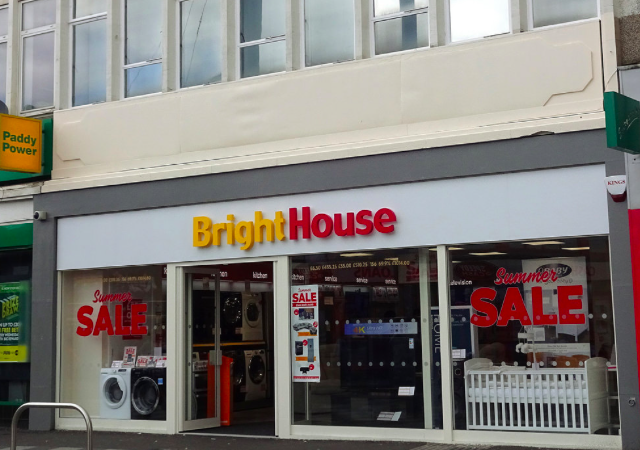Rent-to-own company BrightHouse were recently fined £14m for exploiting customers and repossessing goods.

The growth of rent-to-own household goods companies shows the absolutely dire state of poverty in Britain — and how market ‘solutions’ seek to exploit rather than help those in financial trouble. We need a societal response.
The Financial Conduct Authority recently fined the rent-to-own provider of household goods, BrightHouse £14.8 million. In order to redress 249,000 customers for 384,000 hire purchase agreements.
These agreements are the contracts between the customer and BrightHouse to rent goods until ownership, such as fridges, televisions and so on. On their corporate website they boast of lending responsibly, looking to help low income families buy the household essentials.
The All Party Parliamentary Group on Debt and Personal Finance found the reality differed from the market.
Conducted in 2015, they stated that ‘22% of rent-to-own customers in arrears have goods taken back or repossessed’. The Chair of the APPG Yvonne Fovargue MP, said:
“Rent-To-Own firms have been cashing in on people’s financial struggles for more than a decade.”
The reason for the rise in access to consumer credit is due to structural changes in the economy, such as: deindustrialisation, labour market deregulation and state benefits that have been decoupled from inflation.
However, it is the change in public attitudes to poverty and welfare from 1983 to 2011. The societal view of poverty has declined leading to the rise of explanations that say individuals are to blame for their situation. As has been echoed by politicians: alarm clock Britain, Just about managing, the scroungers and strivers.
The poverty line defined by the UK government is 60% of median income, but this measure is limited, partly because with think of living in terms of income (consider strikes in support of higher wages) but also because in doesn’t include a minimum living standard.
As the researchers at Poverty and Social Exclusion note, poverty should be viewed through a consensual method. At present, the general public view the causes of poverty as situated in individual choices, preferring moralism such as: laziness or willpower.
When poverty is understood and explained in narrow economic and moralistic terms, it comes as no surprise that low-income earners seek market solutions to maintain basic living standards.
The FCA’s own research found that low-income users of consumer credit were using their borrowing to support their housing, heating, food and other expenditure. Only two of the thirty-three participants had access to any savings.
Whilst the general public broadly agree that adults and children should have access to fresh fruit and at least two meals a day, according to the Centre for Diet and Activity Research, they found that healthy foods were consistently more expensive than less healthy foods.
Rather than relying on new and ineffective market solutions – consumer credit, payday loans, rent-to-own goods — or upon charity, our thinking about tackling poverty as a society needs to be updated.
Like the 1942 Beveridge Report and the creation of the welfare state, a new structural approach is needed.
The Institute for Global Prosperity has put forward a proposal for Universal Basic Services’.
By expanding public services of healthcare, legal access and access to democracy – they seek to provide four more basic services: housing that is needs-based, information that includes access to a telephone and internet access, a food service to tackle food insecurity, and a free local public transport.
Only by addressing poverty structurally, can we create a society that offers public goods we can all own.
Huseyin Kishi is a member of the Green Party and a media reform activist. He can be found on Twitter here.
Left Foot Forward doesn't have the backing of big business or billionaires. We rely on the kind and generous support of ordinary people like you.
You can support hard-hitting journalism that holds the right to account, provides a forum for debate among progressives, and covers the stories the rest of the media ignore. Donate today.




One Response to “The market will only ever exploit those in poverty — we need a societal response”
Dulari-Leiylah Markelke
First oust the tories and let’s begin to have a society for the many the insult that tories now use a country for everyone shows how arrogant and how normal they see and rule by hierarchy rich for rich now considering taxing self employed not their corporates not their tax havens not those companies who use loop holes. The entire system needs people orientated overhaul